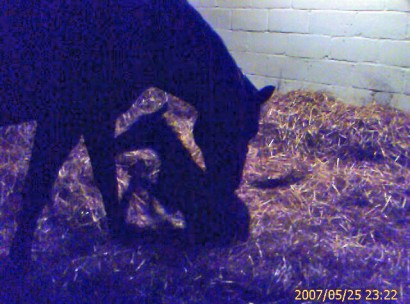Care of the newborn foal
 Points to observe in the first 24 hours
Points to observe in the first 24 hours
Most foals make the transition from being inside the mare to the outside world quite easily. Sometimes, however, they can be very quickly overwhelmed by disease, infection or post foaling complications. It is therefore critical that somebody is present at foaling and continues to monitor the newborn foal throughout its first 24 hours of life.
The placenta is normally passed within 6 hours of foaling; this should be kept to be examined by the vet for signs of disease or infection and to ensure it is complete. A vet should check the mare and foal within 24 hours even if everything seems normal. This involves a general examination of the foal including blood sampling to ensure there is adequate transfer of immunity – an IGg test. The vet should also examine the mare to check she has not suffered undue trauma associated with the foaling.
A healthy full-term foal will be completely covered with soft but dense hair. Body condition should be light – not emaciated or fat, and size should be appropriate for its breed. They should be bright, aware and responsive to noise, movement and touch. However, foals tire easily and require lots of sleep.
Healthy foals are able to use their suck reflex within minutes of birth and will usually stand, find the mare’s udder and begin nursing within 2 hours. Colostrum is the thick, sticky milk produced by the mare at the time of foaling. It is rich in antibodies produced by the mare’s immune system to fight infection. The foal is born with essentially no immunity to disease and it is therefore vital that they receive adequate colostrum within the first 18 to 24 hours of life. Foals nurse frequently, but for short periods.
Meconium is the first faeces produced by the newborn foal. In most cases the meconium is like pellets, although sometimes it is pasty. It is dark brown in colour unlike the stool the foal produces once the milk starts to come through which is yellow-brown and pasty. If the foal appears to be drinking excessively, for increased periods, with no faeces being passed, there maybe meconium retention – call the vet.
Foals generally urinate within the first 6 to 8 hours of life. They usually pass a great deal of clear urine.
The umbilicus / umbilical stump should be treated with 0.5% chlorhexidine or sprayed with antibiotic spray as soon as possible after birth without interfering with the foal’s first stages. Any evidence of dribbling from the umbilical stump warrants immediate veterinary attention.
Respiration rate will vary – the first 30 minutes 60-80 breaths/minute, then after 1 hour 30-40 breaths/minute
More information
Factsheet from Arundel Horse Vets
